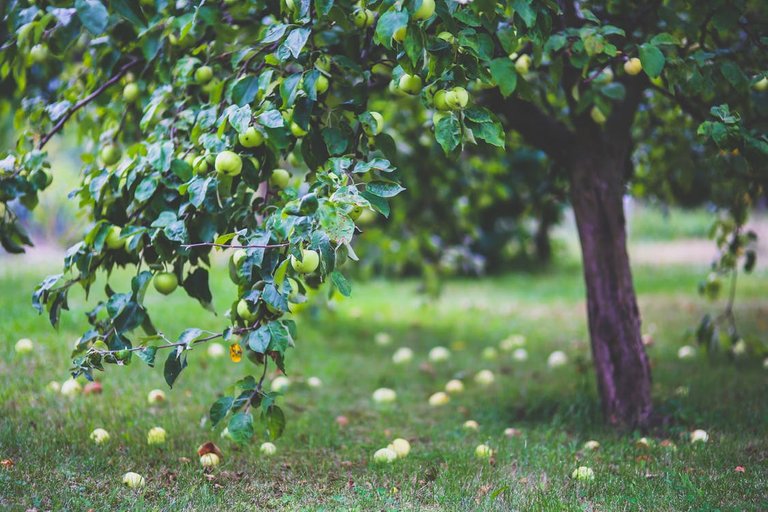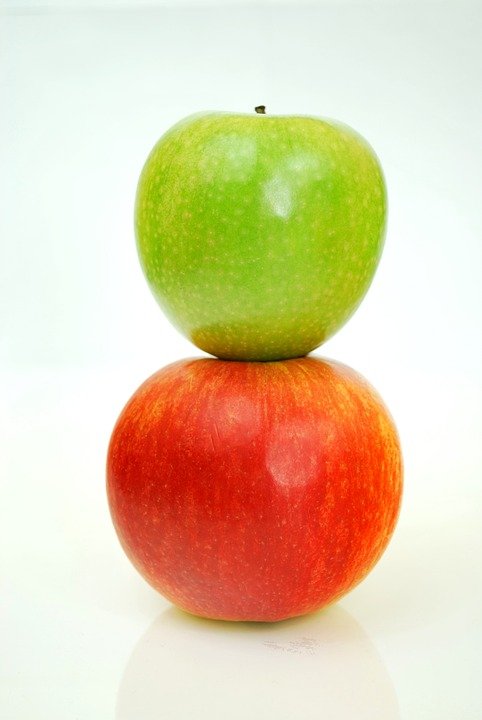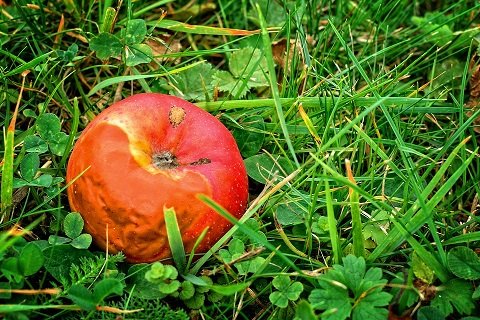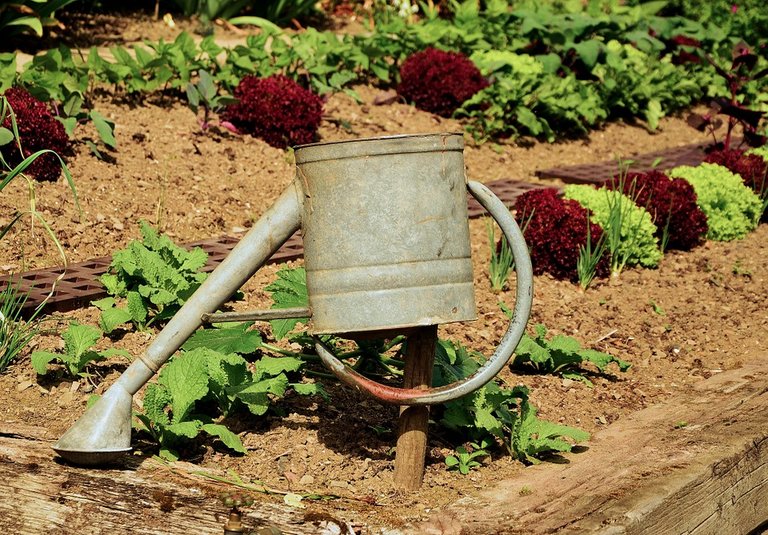
Well, if you are like me you love apples. They are my favorite fruit, especially the green ones. I am fortunate enough to have a fresh supplies of apples in my mother´s garden. And today I will try to convince you to get that, too. In today´s post I will walk you through the process of planting an apple tree and, along the way, will report my findings after reading some journal articles about the health benefits. This is an opinion piece, which has scientific background. In order to be transparent I invite you to check my sources. I will also suggest some futher reading at the end of this post and I hope I can motivate you to do some research yourself. Anyways, let´s get at it.
Step One: Get The Garden Ready And Plant That Tree
It is common knowledge that activity has various health benefits. Gardening means moderate physical activity and does have perceived positive effects on individuals. From personal experience: my grandma is still doing gardening and she is fitter mentally and physically than most people her age. This is an just an illustration. A study has looked at several benefits of community gardens in Southeast Toronto. Growing urban health: Community gardening in South-East Toronto is a study that does not focus on statistics, but personal experiences.
It is interesting to read some of the comments of participants in this study. One of the most extreme ones I found was "It helps you hold onto life" (1). So, while not quantitative in nature, this study shows that people in Southeast Toronto perceived to feel better when gardening. A study by Shoemaker and Park observed body position of 15 elderly gardeners and concluded that gardening brought health benefits as well as risks (lower back pain was a common complaint of the observed gardeners). It is very difficult to find studies that deal with health benefits of gardening, so from here on I will establish, based on the cited literature, that gardening is moderate physical activity - granted, this is mostly true for elderly people, but societies tend to be older on average so I think this is appropriate for this post. Taking a step back, I am now looking at health benefits of physical activity. There are many studies out there focusing on health benefits of long term physical activity. In Long-term health benefits of physical activity – a systematic review of longitudinal studies the researchers analyzed a lot of data and concluded that prolonged physical activity decreased the risk of diseases like coronary heart disease or type 2 diabetes mellitus. Health benefits of physical activity in older patients: a review confirms the findings of the previous study and state an even broader variety of health benefits, including lower mortality, better bone health and reduced risk of certain cancers (breast and colon). It should be noted that this study focused on older people. Well, there are more studies that find correlations between physical activity and health. Studies like Exercise and well-being: a review of mental and physical health benefits associated with physical activity shows that physical activity can improve mental health. Other studies like Health benefits of physical activity: the evidence confirm what I mentioned above. Well the plot thickens and I think we have sufficient scientific evidence (at least for the scope of this post) to confirm the following: "moderate physical activity has various health benefits".
Ok, how does that relate to planting an apple tree? In order to profit from physical activity, you need to continuously do it. You can either plant very many apple trees, or you can build a bigger garden with more plants. Anyways, when you are planting your apple tree you are doing something good for your health.
Step Two: Wait For Them Apples
Granted, this is only a two-step process. This is desirable in science (makes things easier and more effective). Anyways, the probably biggest benefit of planting an apple tree is that you have a basically unlimited supply of fresh apples. Let´s take a look at some of the benefits of eating apples from your apple tree.

The consumption of fruit has been shown by various studies to have positive health effects. In a very large study - Prospective Study of Fruit and Vegetable Consumption and Risk of Lung Cancer Among Men and Women - it was found that fruit and vegetables can decrease the risk of lung cancer. This decrease was, however, not statistically significant. A very comprehensive review article titled A Comprehensive Review of Apples and Apple Components and Their Relationship to Human Health concluded that there is convincing scientific data that suggests that phytochemicals commonly found in apples has beneficial effects on human health. But what in the world are phytochemicals? Well, they are naturally-produced chemicals. As the name suggests, they are made by plants. In the case of apples, the very common ones are phenoles. This is a very broad group of chemicals. For example, phenolic compounds are not only healthy. Some endocrine disruptive compounds (like estrogen, bisphenol A, etc.) are phenolic compounds.

group - Public domain
In apples, the two beneficial phenolic groups are flavonoids and phenolic acids (2). One of the suggested main ways in which these phenoles are beneficial in health is through their antioxidant activity (3). Apples are high in flavonoids (4). A study conducted on Hawaii, Intake of Flavonoids and Lung Cancer, has shown that flavenoids seem to decrease the risk of lung cancer. This has not been the first of such studies. A few years earlier, an article Dietary Flavonoids and the Risk of Lung Cancer and Other Malignant Neoplasms has stated a very similar conclusion. I could go on and cite more and more studies why apples are healthy and which particular phytochemical is responsible for the obersved effect. Rather than doing that, and possible motivating somebody to buy supplements. Here is a review article that talks about health benefits of apples: Apple phytochemicals and their health benefits. I will try to explain why eating an apple is better than consuming equal amounts of phytochemicals separately. It seems very obvious: this compound may do this in your body so eat this compound to achieve this result - and then obviously the more the better. I believe that this is the most common misconception when it comes to health and diet, or even medicine. That is the reason why the supplement industry is continuously growing, even though the scientific evidence shows little to no benefits. But why does the scheme not work? Why does taking an isolated plant compound not prevent all the disease? The missing link: synergistic effects. The beauty of our body´s biochemistry is the complexity. Even though we have studied and (somewhat) understood complex systems like the Krebs Cycle, it is very difficult to predict what the intake of one compound does to the system. Our body is a dynamic system that tries to reach a point of balance, or homeostasis (not equilibrium: that would mean we were dead). Often times taking in compounds in high dosages means either completely messing up the biochemical balance in your body, or just peeing very expensive pee. What has synergism to do with this? Well, a single apple may not have the same amount of vitamin C as a supplement, but it also contains many other compounds like flavenoids. These compounds seem to work together in our body. I would highly recommend the review article by Rui Hai Liu. In this article Liu describes some observations described in the literature. For example does he mention that consumption of β-carotene supplements did not have the same effects as eating green and yellow vegetables and fruit (5).
Ok ok, lets go back to your apple tree. You either waited a few years or bought a tree that could bear fruits right away and now there they are: bright color, shiny in the sun, with a little drop of dew in the early morning. Man I wish I had an apple now. Just imagine picking that apple from your tree and taking a big bite. What do you think? This tastes so good! Or maybe something like this: I love you! One thing you will surely not think about is: So many pesticides! Yes, you are right, if you do not use pesticides, you will most likely not have them on your apple! And pesticides can be an issue. A study in Poland found that over 60% of their apple samples contained pesticides (6).

Now, let me briefly summarize what we learned today:
- Moderate activity is good for you (gardening might just be that)
- Apples contain phytochemicals
- Phytochemicals may prevent certain diseases (cancer, cardiovascular disease, etc.)
- It seems to be better to eat whole fruits rather than supplements
- Growing your own apples will prevent you from having pesticides on your apples
Now you may make out of that what you want. To me this sounds like a very sweet deal - literally. The problem: I am a poor student with no land to plant an apple tree on. However, as soon as I have land, or a garden, I will plant a variety or fruit trees.
Suggested Further Reading
If you have some time at hand I would recommend you reading some of these review articles.
- Hyson: A Comprehensive Review of Apples and Apple Components and Their Relationship to Human Health
- Hagen et al.: Phenolic contents and other health and sensory related properties of apple fruit (Malus domestica Borkh., cv. Aroma): Effect of postharvest UV-B irradiation
- Boyer and Liu: Apple phytochemicals and their health benefits
- Liu: Health benefits of fruit and vegetables are from additive and synergistic combinations of phytochemicals
- Lozowicka: Health risk for children and adults consuming apples with pesticide residue

I started working on this post before my several week long hiatus. It was not until today that I found the time to finish it. I also want to give a shoutout to @csusbgeochem1 for his very encouraging words. I had no idea I actually had "fans" and people who really care about my content.
Hopefully I was able to convince you that growing your own fruits is better than just buying it in the store. To me growing food is also somehwat relaxing and, I know this sounds dumb, it makes me feel more like a man. There is something honorable to working the land. Again, I know this sounds funny but I am funky anyways.
A little tip on the side. If you cannot plant an apple tree because you live in an appartment: plant pees. I will start doing that as soon as I moved into my own appartmemt (probably in Newcastle upon Tyne). It is pretty simple and I have done that before. Also PEES ARE REALLY YUMMY!
Anyways, you have probably spent enough time reading my post so I will end it here. Looking forward to your comments. I will try to answer every comment (unless bs comments).
As always,
Cheers @lesshorrible!
